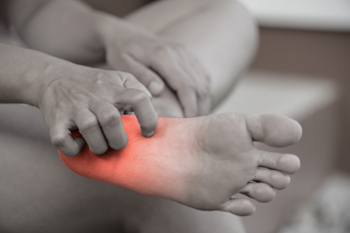 Peripheral neuropathy results from damage to the peripheral nerves, which transmit signals between the central nervous system and the rest of the body. This damage often leads to numbness, tingling, burning, and sharp pain in the feet. Diabetic neuropathy occurs in individuals with diabetes as a result of prolonged high blood sugar levels that damage the nerves. Symptoms in the feet may include a loss of sensation, making it difficult to detect injuries or a feeling of wearing tight socks when barefoot. These symptoms can significantly impact balance and mobility, increasing the risk of falls and infections. Proper management of blood sugar levels, in addition to medications and lifestyle changes, may help to alleviate symptoms of neuropathy. If you are experiencing any of the above symptoms, it is suggested that you confer with a podiatrist who can help you to manage this condition.
Peripheral neuropathy results from damage to the peripheral nerves, which transmit signals between the central nervous system and the rest of the body. This damage often leads to numbness, tingling, burning, and sharp pain in the feet. Diabetic neuropathy occurs in individuals with diabetes as a result of prolonged high blood sugar levels that damage the nerves. Symptoms in the feet may include a loss of sensation, making it difficult to detect injuries or a feeling of wearing tight socks when barefoot. These symptoms can significantly impact balance and mobility, increasing the risk of falls and infections. Proper management of blood sugar levels, in addition to medications and lifestyle changes, may help to alleviate symptoms of neuropathy. If you are experiencing any of the above symptoms, it is suggested that you confer with a podiatrist who can help you to manage this condition.
Neuropathy
Neuropathy can be a potentially serious condition, especially if it is left undiagnosed. If you have any concerns that you may be experiencing nerve loss in your feet, consult with Edward Sharrer, DPM from Premier Foot and Ankle Clinic. Our podiatrist will assess your condition and provide you with quality foot and ankle treatment for neuropathy.
What Is Neuropathy?
Neuropathy is a condition that leads to damage to the nerves in the body. Peripheral neuropathy, or neuropathy that affects your peripheral nervous system, usually occurs in the feet. Neuropathy can be triggered by a number of different causes. Such causes include diabetes, infections, cancers, disorders, and toxic substances.
Symptoms of Neuropathy Include:
- Numbness
- Sensation loss
- Prickling and tingling sensations
- Throbbing, freezing, burning pains
- Muscle weakness
Those with diabetes are at serious risk due to being unable to feel an ulcer on their feet. Diabetics usually also suffer from poor blood circulation. This can lead to the wound not healing, infections occurring, and the limb may have to be amputated.
Treatment
To treat neuropathy in the foot, podiatrists will first diagnose the cause of the neuropathy. Figuring out the underlying cause of the neuropathy will allow the podiatrist to prescribe the best treatment, whether it be caused by diabetes, toxic substance exposure, infection, etc. If the nerve has not died, then it’s possible that sensation may be able to return to the foot.
Pain medication may be issued for pain. Electrical nerve stimulation can be used to stimulate nerves. If the neuropathy is caused from pressure on the nerves, then surgery may be necessary.
If you have any questions, please feel free to contact our office located in North Little Rock, AZ . We offer the newest diagnostic and treatment technologies for all your foot care needs.



